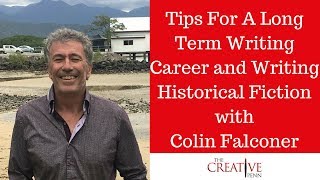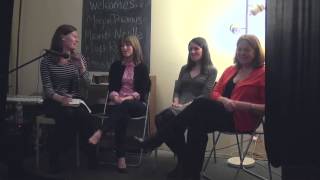Sunday, 18 January, 2026г.
















Где искать: по сайтам Запорожской области, статьи, видео ролики
пример: покупка автомобиля в Запорожье
Tips For A Long Term Writing Career And Writing Historical Fiction With Colin Falconer
Get your free 7 Steps to Write your Novel cheatsheet at: http://www.thecreativepenn.com/7steps
Colin Falconer is the international bestselling author of over 40 books translated into 23 languages, described as similar to Ken Follett - books with romance and high adventure, drawn from many periods of history.
How Colin started out in advertising as a copywriter because his early manuscripts didn't get published. He moved into scriptwriting for TV and other freelance work for magazines. After one article helped him get an agent, he started writing novels.
Does writing get easier after 40 books?
Colin it has got easier but he has only thought 'he knows what he is doing about 3 years ago. So it was faking it while you make it for about 25 years! [ I think this makes all writers feel better.] You can only learn so much from books and classes, and in the end, you just have to do it.
On writing historical fiction
Isabella, Braveheart of France, Colin's latest book, is based on a story he found fascinating. Isabella was married to a king who was actually gay, and loved another man. This is a very contemporary predicament in the 13th century.
How much of historical fiction needs to be 'true' and how much is fictional story. Colin's writing speculates on real history, and in the end, he cares about the story first.
On writing religion and walking the line, for example, in Colin's Jerusalem series.
On gender issues with writing romance - or love stories - as a man.
How travel is a key part of Colin's life ... and his books
On deciding to write books based on places he wanted to travel to. [I do this as well!]
About 'The Year We Seized The Day,' which is more of a moving travel memoir, written under the pen name Colin Bowles
On the publishing industry and the future ...
Colin is a hybrid author, working with Cool Gus (indie idol Bob Mayer's imprint) as well as working on contracts with big publishing. Colin talks about some of his books that have failed miserably under print publishers but have succeeded spectacularly as ebooks. He talks about the anger and frustration of authors treated shabbily by large publishers, even to the point of having to change his author name due to the vagaries of the Bookscan system. [You can read Colin's blog post about this here.]
The positive side of the ebook revolution and the way the internet connects authors directly with authors. It enables readers to discover new writers, as many are sick of the same authors and same stories delivered over and over again in the bookstores. Instant gratification is also fantastic! Readers also have a stronger voice now, which is a mixed blessing in terms of reviews. But hearing from readers and talking to them directly is a much more symbiotic relationship.
On marketing. The blog as a connection with readers, but you don't know what will happen in the future, so you need to make sure you have your own site, and email list ... just in case. We are still in the early stages of the revolution!
On global markets. We talk a little bit about the Australian market and Colin sees a change in the year he has been gone, because ebooks seem to have gone mainstream, as opposed to being 'that American thing.' Colin has always sold well in Eastern Europe and he's like a rock star in some of those countries, even recognized in airports. Harem sold 180,000+ in Germany, but didn't do anything in the UK, Australia or USA. It just goes to show that we can never know where our readers are. [Check out this article on rights and this article on publishing in Germany for more.]
Colin's lessons learned from 25 years in the publishing game
Don't diversify your genre. The really top authors have not diversified. Being a one trick pony is not a bad choice. Learning about author branding is critical. Be more cautious about rights. Publishers may seem like your friend when they make an offer, but Colin has done a lot better with many books of his through ebooks than print. It's worth taking a good look at the contract as opposed to being seduced by the dream.
Теги:
colin falconer Historical Fiction (Literary Genre) joanna penn the creative penn writing tips historical romance colin bowles writing historical fiction writing historical romance self-publishing tips author entrepreneur
Похожие видео
Мой аккаунт


 У вашего броузера проблема в совместимости с HTML5
У вашего броузера проблема в совместимости с HTML5


